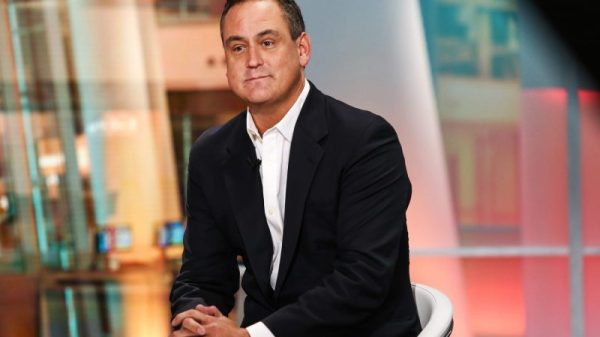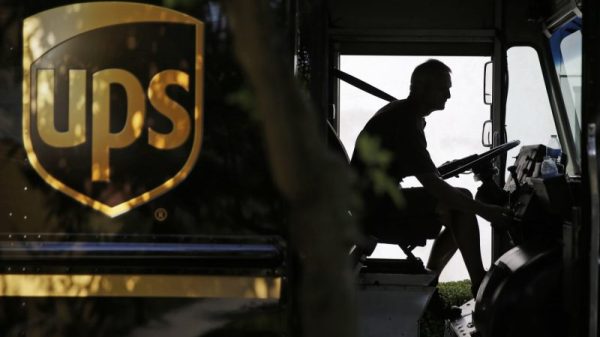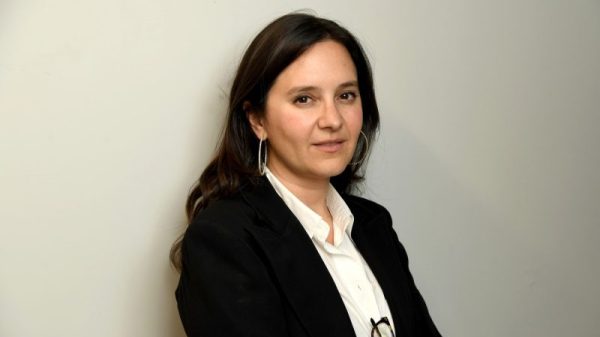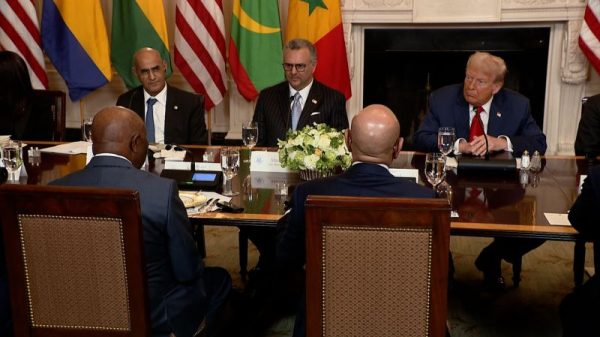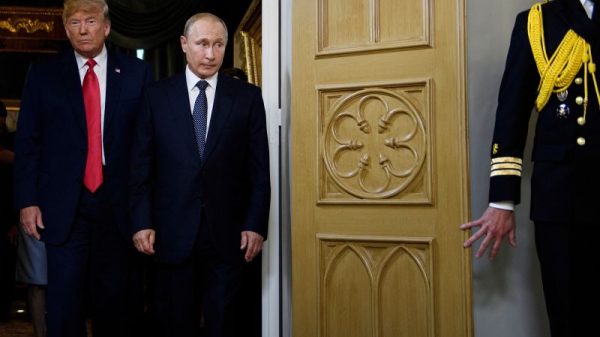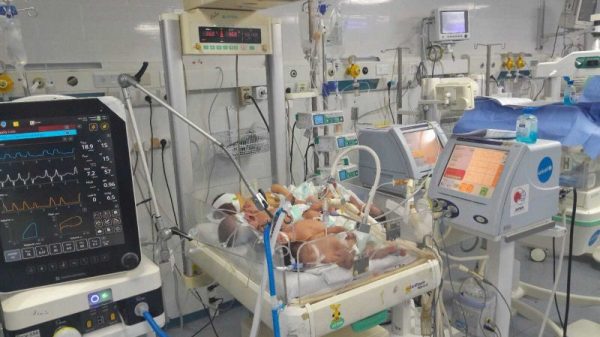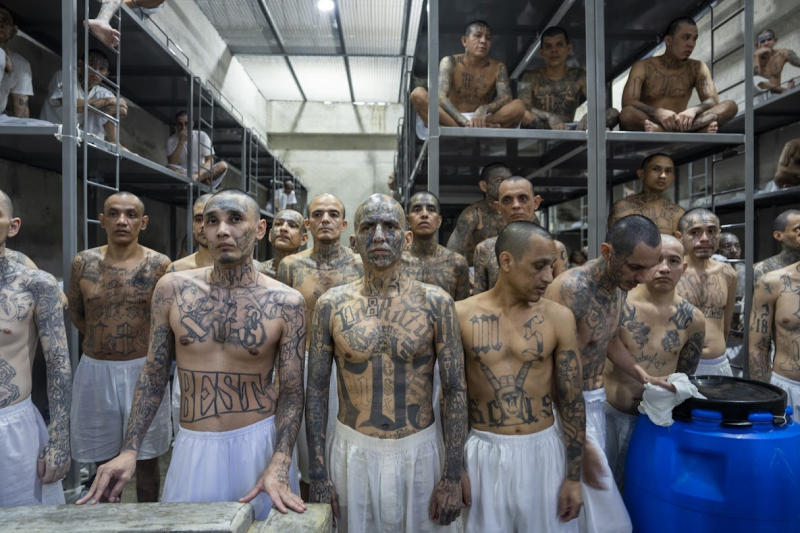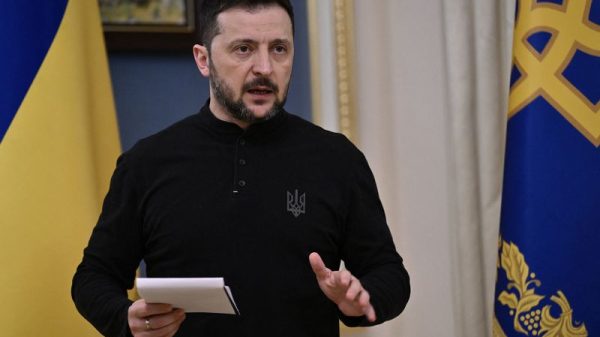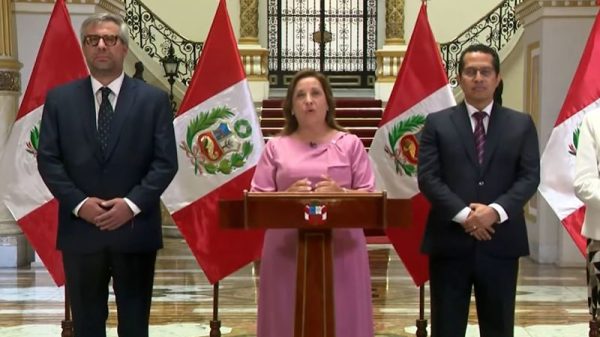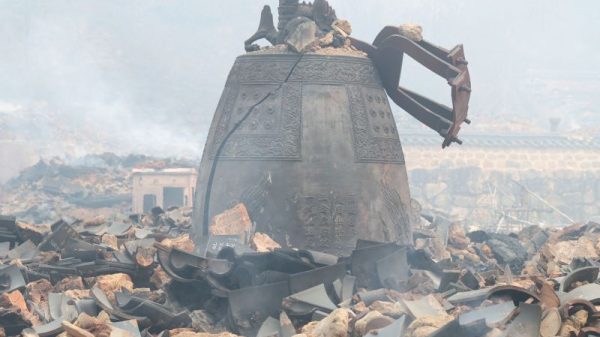Sunlight pours into the cavernous building. A towering ceiling and polished floor give the look of a railway station or airplane hangar. But the air is still and intensely claustrophobic. Down the long sides of the hall are large built-in cages, each containing dozens of men staring out. This is Cecot — El Salvador’s Terrorism Confinement Center — and the men are known as the “worst of the worst.”
Mass murderers, drug dealers and gangsters, they are accused of once holding El Salvador hostage, gripping the nation with fear as they ruled cities and streets. Today, they are stripped of freedom, influence, and individuality. And they may never get them back.
Each wears a simple white T-shirt and shorts. Some have white socks and sandals. Their heads have been shaved and some have tattoos covering their faces. Many stand confidently, even defiantly, arms crossed within a few feet of the floor-to-ceiling bars, trying to get a better look at us. Others sit cross-legged and motionless on four-tiered metal bunks that line the cells. And still others are at the back, looking down or away from us, wearing face masks, as if they want to avoid being seen on camera or to catch our eyes, almost ashamed.
We are the only outsiders here, granted exclusive access and a private tour as the first major US news organization allowed inside Cecot late last month. Opened less than two years ago, it is already an iconic feature of the “new El Salvador” of President Nayib Bukele. Under his strongman rule, the Central American nation has been transformed. Once the “murder capital” of the world, it is now far safer and family life and businesses have returned to the streets. But the ruthless cleaning up of those streets and merciless treatment of gang members have triggered outrage and concern among human rights organizations, which have condemned Cecot as inhumane and unacceptable.
The hard-hearted treatment of men is on full display throughout Cecot. Each of the more than two dozen group cells we see in Sector 4 are built to hold 80 or so inmates. The only furniture is tiered metal bunks, with no sheets, pillows or mattresses. There’s an open toilet, a cement basin and plastic bucket for washing and a large jug for drinking water. The cells are meticulously clean — an intentional and stark contrast to the dingy and squalid prisons of El Salvador’s past.
The men are inside these cells for 23½ hours a day. They do not work. They are not allowed books or a deck of cards or letters from home. Plates of food are stacked outside the cells at mealtimes and pulled through the bars. No meat is ever served. The 30-minute daily respite is merely to leave the cell for the central hallway for group exercise or Bible readings.
There is no privacy here, no trace of comfort. Armed masked guards provide constant surveillance and prison officials say the lights are on 24/7. There is a haunting stillness as the prisoners’ hollow stares meet our curious gaze. There’s an emptiness in some of their eyes, an unnerving vacancy that suggests their souls have departed, leaving mere shells behind.
The deprivation is deliberate, a departure from pre-Bukele times when inmates were said to eat better than civilians. “Now, here, what they get for breakfast is beans, cheese or a mix of rice and beans, maybe plantain and a cup of coffee or atole (a corn-based drink),” says the director of Cecot, Belarmino García, as he shows us around. “For lunch, it’s rice, pasta, and a beverage. Dinner is the same as breakfast. Meat doesn’t exist here, chicken doesn’t exist here, special menus don’t exist for anyone.”
Outside of war, there is no death penalty in El Salvador but there is also no intention that these men will ever be released. Gustavo Villatoro, El Salvador’s public security minister, offers a blunt assessment of the government’s approach to gang members. “We believe in rehab, but just for common criminals,” he says, differentiating between so-called gang “collaborators” and gang members.
“Someone who every day killed people, every day raped our girls, how can you change their minds? We are not stupid,” he adds. “In the US, imagine a serial killer in your state, in your community being released by a judge … how would you feel as a citizen? We don’t have facts that someone can change a mind from a serial killer … and we have more than 40,000 serial killers in El Salvador — the members of these gang organizations,” he says.
‘I wanted to be a gangbanger’
We ask to speak with an inmate, and prison officials remove 41-year-old Marvin Vásquez from a group cell. The self-admitted MS-13 clique leader says he’s willing to talk to us, if only to discourage young people from following his ways. We meet him already seated on a chair in a concrete-walled side corridor, out of sight from the other prisoners. His hands and ankles are shackled as two guards — in head-to-toe combat gear — stand over him, facing each other.
Vásquez says he was raised in Los Angeles and speaks in perfect English with a calm confidence. He recounts the life that led him here with an ease that belies the brutality of his words. “Some people wanted to be lawyers, cops, soldiers,” he tells us. “I wanted to be a gangbanger. And I wanted to accomplish everything I put my mind to. And until this time, I think I accomplished everything I wanted to accomplish.” Vásquez, who was imprisoned pre-Bukele, says he joined MS-13 as a boy, rising through the ranks. He even created his own clique, “Crazy Criminals,” now tattooed across his back, after he returned to El Salvador.
When we ask about his crimes, he is chillingly matter of fact. “Rob, murder, do what you got to do to survive,” he says with a slight shrug. “You killed people?” we press him, to which he replies without hesitation, “Yeah. That’s the gang-banging life.” While expressing regret for ever joining a gang, his estimate of his victims is as casual as his tone. “I don’t even know how to tell you how many,” he says. “We don’t be thinking about how many we got to kill. We just do what we got to do to survive.” He concedes it could be “at least 20 to 30,” though he’s not certain of the exact number.
He recalls “blasting up” a car full of people in the US, admitting it’s “possible” they didn’t survive. Reflecting on life in Cecot, he says with a detached acceptance, “It’s probably not a hotel (with) 5-stars, but this is what is for us. They give you the three times a (day) food. They give you some programs. You get to do exercise. Some church or religion programs too. But you know, that’s how it is. We got to get used to what we got to get used to right here. There’s no option for us. We did bad things. We pay it the rough way, doing time.”
As the conversation with Vásquez ends, guards move in swiftly to take him away. Prison chief García wants to hammer home the point. “As you just observed, how they so cynically say, ‘Yes, I have killed, I did this, I did that’,” he says. “What we have here is the worst of the worst.”
Watchtowers, electrified fences and armed guards
Members of different gangs are deliberately housed together. In front of one cell, an officer orders the inmates to remove their shirts. They do so meekly and immediately, revealing tattoos for MS-13 and Barrio 18 — sworn enemies outside this place, forced bedfellows inside.
For anyone who does commit “grave offenses” against other prisoners or staff, solitary confinement awaits — cement cells that hold inmates for up to 15 days. The rooms are pitch-black save for a small hole in the ceiling, two stories above, that allows in a sliver of light. A cement basin, a toilet, and a concrete slab for a bed are the only furnishings. Meals are passed through a door slot.
Inmates never leave their sectors. Concrete side rooms can be used for legal consultations and court hearings via video. We see medical staff who provide any treatment needed, again, on-site.
No visits from family or friends are allowed under the rules. Anyone arriving at the prison gives up all personal items and is physically searched and electronically scanned for any contraband. A thousand armed security personnel — guards, police and soldiers — are ready to respond to any threat from outside or inside.
The prison itself is ringed by multiple electrified fences with 19 watchtowers surrounding the facility, built in isolation in a rural area away from any town. Checkpoints start before you see the buildings, with vehicles searched and identities verified. Cell signals vanished as we approached the prison’s towering steel gate — the only way in, or out.
Cecot was built in just seven months and opened in January 2023 to hold up to 40,000 inmates. For security reasons García does not disclose the exact population, but he concedes that between 10,000 and 20,000 inmates are currently housed here.
‘It’s too extreme’
Bukele’s state of emergency, declared in March 2022, has led to the arrest of at least 81,000 individuals — more than 1% of the Salvadoran population — a sweeping effort to root out gang influence. Bukele has admitted that some innocent people have been caught up in the net, with 7,000 of them already released, according to the government. He and his many supporters argue that such collateral damage is part of the difficult process of transforming a nation gripped by decades of corruption and violence.
“Why do we have the biggest incarceration (rate) in the world?” Bukele asked in June. “Because we turned the world’s murder capital into the safest country in the Western Hemisphere. The only way to achieve that is to arrest the murderers … we don’t have a death penalty, so we have to imprison them all.” In early 2016, there was an average of a murder every hour in this country of just six million people. Now government statistics indicate there are more days without a homicide than with one, with a total of 104 killings reported in the first nine months of this year, a third of which were family violence.
Critics inside and outside El Salvador question the veracity of the government’s crime data and claimed success over the gangs. And even if true, they argue that Cecot’s strict control and isolation of prisoners crosses the line into human right abuses.
“The abuse starts with how they enter the prison and how they are kept inside … it’s too extreme,” says Juan Carlos Sánchez, program officer for the Due Process of Law Foundation, which campaigns for human rights and the rule of law across Latin America.
“For example, the food of a person in state custody — like in Cecot — is a human right that cannot be deprived … it must be an adequate diet for them, not just to survive.”
Sánchez adds there are concerns about due process — with Cecot used for both convicted men and those still going through the court system — and what he called “oppressive control.”
“What worries us the most, is these prisoners enter a penitentiary system, and they lose all contact with the outside world, including contact with their families … this impacts others, not just the prisoners,” he says.
“Under these conditions, if they are ever out, they will not be rehabilitated … they will become a burden for the state, they will come out sick physically, mentally, they will come out with rage.”
Before we could even ask about those allegations, Cecot’s García offers: “Much has been said about Cecot and human rights violations, but you are seeing everything we do — medical assistance, ensuring they follow due process … the whole operation is based on strict respect for human rights.” To him, Cecot’s harsh restrictions are both justified and necessary, a “last barrier” between these criminals and civil society.
A government officer traveling with us is on her first visit to Cecot. A woman in her 20s, she reflects on her own past in El Salvador and a time — only a few years back — when carrying a cell phone in public or staying out after dark was unthinkable, inviting robbery or worse. “I can breathe easier now,” she tells us quietly as she surveys the caged men.
As we climb one of the watchtowers overlooking Cecot, the sun dips low, casting the vast complex in shadow. The facility stretches beneath us, with rows of barbed wire, concrete walls, and looming guard towers fading into the hilly and lush terrain. Built to hold the darkest echoes of El Salvador’s past, it feels like an isolated city, a world apart, where prisoners are erased from society.
Renewed life outside the prison walls
More convicts could be on the way to Cecot for the crackdown is not yet over. The Supreme Court overturned a constitutional ban on consecutive presidential terms in favor of Bukele and the president stood for and won an unprecedented second term earlier this year. The so-called temporary state of emergency is now more than two years old.
After leaving the sterile and muted interior of Cecot, we join a force of approximately 2,500 police and soldiers patrolling a neighborhood in San Salvador flagged for potential remnants of gang activity. Heavily armed troops navigate the narrow, dimly lit alleys as families inside their homes sit seemingly unfazed, eating dinner or watching TV.
We ask a man in his mid-50s how it feels to have such an imposing military presence right outside his door. Throwing on a t-shirt, Salvador Molinas tells us he, in fact, feels reassured by the soldiers, noting that this visible force was why he now felt it was safe enough to let his teenage sons go to school and social outings on their own.
“I see the men (soldiers) here with us and honestly this is good, we feel safe, this was missing before,” says Molina, who lives with his boys and his mother.
“I have a son in college and another in the 7th grade and thanks to God, I let them go (to class) with confidence. I used to have to take the youngest to class and now he goes on his own by bus, and I don’t have the fear that something will happen to him,” he adds.
“Since the president took office, thank God, we’ve lived calmly, something we didn’t have with prior presidents.”
Bukele’s crackdown on gang violence has garnered widespread support among Salvadorans, even as his methods remain divisive. Since taking office, he has consolidated control over the judiciary, silenced critics, and sidelined political opponents. Yet, most people we meet see these measures as vital for restoring safety — and Cecot has become a powerful symbol of this tough-on-crime approach.
You cannot see the prison from the capital city, and the boisterous night streets are a jarring contrast to the gleaming but soulless interior of Cecot where silence and surveillance reign.
But for so many Salvadorans, they go together. The prison where gang members lose all their power and autonomy has given them their freedom to live.






